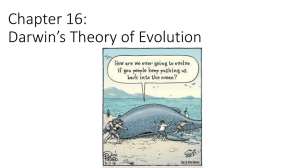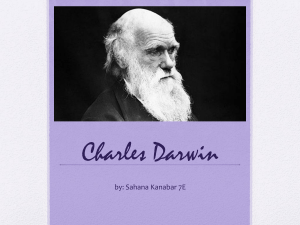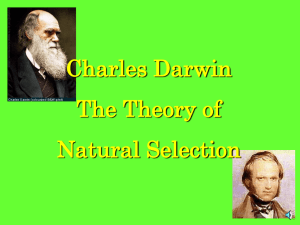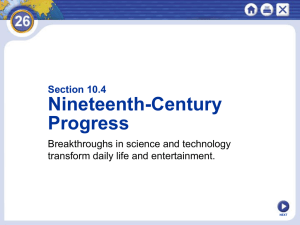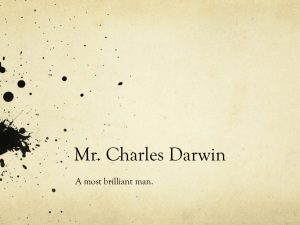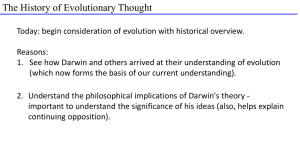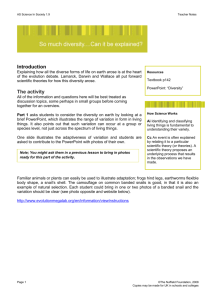Lecture 9: The Beginnings of Evolutionary Psychology
advertisement
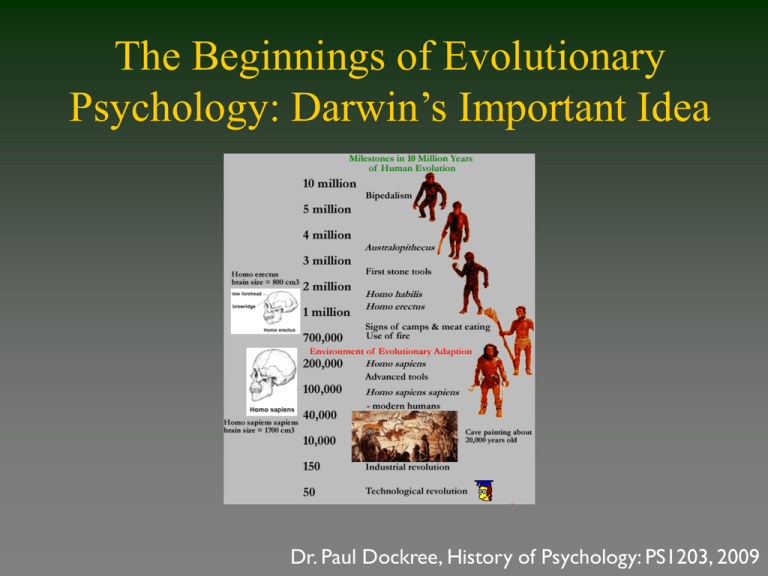
The Beginnings of Evolutionary Psychology: Darwin’s Important Idea Dr. Paul Dockree, History of Psychology: PS1203, 2009 Heraclitus (circa 535–475 BC) Heraclitus (pre-Socratic) “The Weeping Philosopher” His philosophy is recognized as similar to Taoism Everything flows and nothing stands still. Panta rhei - everything flows "one cannot step twice into the same river." Whereas the Pythagoreans and Plato had emphasized harmony, Heraclitus suggested that life was maintained by a tension of opposites Wisdom comes from understanding this eternal dynamic The big 19th Century debate: Are species static or changing? Many people, including respected scientists such as Harvard’s Louis Agassiz, believed the world was created and set in motion according to Newton’s laws, but was otherwise static. Statute of Agassiz at Stanford U. Zoology building after San Francisco earthquake Louis Agassiz, a Swiss zoologist and palaeontologist, was one of many respected scientists of the time who believe that the natural history of humans as a species was specified by God Progress in the 18th & 19th centuries • Natural order of the world – hierarchical structure to society . • Momentous change after the Renaissance period • Idea of progress though outpacing the competition. • Dismissal of superstitions and acceptance of science • Biological based evolutionary progressive ideas from Erasmus Darwin Jean-Baptiste Lamarck (1744-1829) • • • • • French Naturalist and early proponent of evolution He classified animal collections in the Paris Museum of Natural History He believed that evolution occurred because of a tendency for organisms to become more complex Teleology: a doctrine that holds there is a final cause or purpose inherent in all beings. E.g., we have eyes in order to see vs modern naturalist view: a person has sight because of his eyes (function follows form) Consistent with Lamarck, the tree of human evolution according to Ernst Haeckel, 1891 At the top of Haeckel's tree are Menschen - men, and Haeckel meant white European males Haeckel's tree explicitly embeds the notion of progress - things nearer the top are 'more evolved' or 'higher.‘ Lamarck is remembered primarily for a theory of "inheritance of acquired characters" or Lamarckism Lamarck’s idea was the inheritable changes are brought by the internal needs and efforts of the organism - "use and disuse" of characteristics Charles Robert Darwin (1809 – 1882) • Young Cambridge graduate in 1831 but not inspired by his university education • Applies for the post of Naturalist on the H.M.S Beagle captained by Robert FitzRoy Route of Darwin’s voyage on the Beagle, on which he was official ship naturalist. He collected and sent to London large collections of varying species. Darwin’s observations and ideas • What are the possible functions of all animal characteristics? • Animals differed dramatically according to their geographical distribution (i.e., their environment) The Theory of Evolution by Natural Selection • Darwin was aware that other naturalists like JeanBaptiste Lamarck has a rival theory of evolution. • Lamarck’s theory could not explain non-voluntary characteristics. • However, Darwin was convinced of the idea that evolution needed to be taken seriously in opposition to the idea that species were created as perfect fully-formed entities. The Theory of Evolution by Natural Selection Darwin suddenly thought of a plausible mechanism for the gradual evolution of countless stable species in a state of nature – inspired indirectly by Thomas Malthus:Thomas Malthus’ Essay on the Principle of Population as It Affects the Future Improvement of Society (1798) inspired Darwin to discover the role of natural selection in the development of species. The Theory of Evolution by Natural Selection • Darwin honed in on this idea of a natural check on population growth • Those who do survive will disproportionately tend to be the ones best adapted to overcoming the particular dangers of their own particular environment. • And if their adaptive characteristics are inheritable we have a mechanism for natural selection! The Theory of Evolution by Natural Selection • Darwin provided support for his theory with a tremendous amount of supporting evidence from his 5years of data collection from his voyage on H.M.S Beagle • The theory and evidence was published “On the Origin of Species by Means of Natural Selection, or the Preservation of Favoured Races in the Struggle for Life” in 1859 • Arguably the most important book of the century. Darwin and Psychology • • Darwin’s Descent of Man (1871) “there are no fundamental differences between man and higher mammals in their mental capacities” • E.g., courage, kindness, jealousy, pride, shame, playfulness, dreaming, learning from experience • “The difference in mind between man and the higher animals, great as it is, certain is one of degree and not of kind” Darwin argued that human emotional expression are inherited and evolved characteristics, best understood as the direct or indirect consequences of reactions that had adaptive or survival value Human expressions, some posed and some candid, appeared in Darwin's “Expression of the Emotions in Man and Animals” (1872). If people all over the world, no matter how isolated, showed the same facial expression of emotion, those expression must be inherited instead of learned The English Philosopher Herbert Spencer (1820 - 1903) coined the phrase “survival of the fittest” Spencer applied evolutionary thought to society and laissez-faire economics and helped create the ideology known much later as “social Darwinism,” an ideology which Darwin himself never endorsed. Darwin’s legacy The brain and mind could no longer be regarded as static “givens” The mind is a functional entity aiding the adaptation of the individual to the environment All Darwin’s works, including images of his original notebooks are available online at: http://darwin-online.org.uk/
